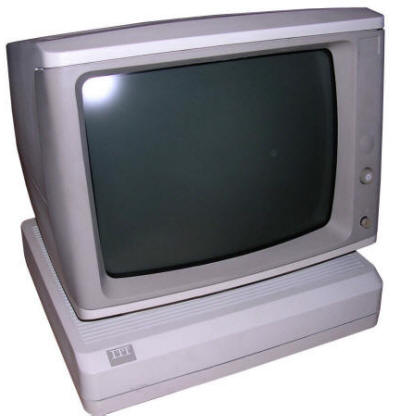ITT Courier 9216-X
This terminal from early 1986 (although they were
introduced probably year earlier) was a functional replacement of IBM
3179 color terminal. Contrary to IBM 3180, it has logic and display
combined in one casing, only the keyboard is external. Its 14-inch color
CRT can display seven colors: red, green, blue, white, yellow,
bright-blue and bright-red.
It can be used as a part of IBM 3270 system - a terminal system which
works not only by simple exchange of text between terminal and
mainframe, but around forms - mainframe can send form, which i filled on
terminal and sent back. This way bandwidth usage in serial port is
minimized.
In this system, IBM developed their own serial link (described e.g.
here) - technically it was a bi-directional serial port using
coaxial cable and BNC plugs being totally incompatible with RS232-based
solutions.
This terminal is IBM-compatible, so it can be used in IBM terminals
network. It is built around MC6800 microprocessor and has 64kB of memory
- in 1986 a typical home computer had this configuration! Logic is made
with proprietary chips made by NCR, PAL circuits and TTL glue chips.
Additionally my unit has one proprietary chip removed from its socket
and put into an expansion board described as "Keyboard Simulator". No
documentation is known about this board and its role, maybe it works as
some enhancement to keyboard operation?
My unit has been imported from Germany in early 1990s. These units were relatively easy to convert into colour PC monitors (as there are red, green, blue and two sync signals) and owner wanted to convert it saving money on expensive display. Fortunately for me, no electronic experts have been found and the unit survived in quite neglected (but electronically untouched) state in a garden shed. It was only needed to replace capacitors to make it start.
Start-up
It boots to simple POST displayed in green while maintaining while status line at the bottom. It shows version number of ROM (the same as in its sticker), and state of "coax" (probably coaxial serial link to mainframe), "kbs" (?Keyboard simulator?) and "kbd" (keyboard).
Disassembly
To get into monitor and power supply, just remove 2
bottom screws and pry the upper cover. Be careful with front latches,
they are like hinges, but they work the way opposite to most typical
casings. You are here.
To get into mainboard: Put the unit on screen on a soft surface, rear of
CPU facing upwards. Unscrew 4 screws (they usually stay in bottom part),
remove bottom part of casing. Slide the rear from upper part of casing
exposing mainboard.
To remove upper CPU part from display part - this is tricky and usually
there is no reason to do it (except if unit was in a garden shed for a
few years and its casing needs to be entirely washed), but after
completely removing mainboard (note where which cables go!) it is
possible to unlatch the metal disc part.
You have to make this disc go totally out or some way be on the other
side of the narrowing in plastic "neck" in which it sits. Now you have
two choices:
1. Unscrew, unwind and unsolder wires from the metal disc part How about
plugs? Will they fit through the hole in disc?.
2. Carefully grind down the narrowing in plastic (on which the disc is
placed), grinding two small breaks (a few mms thick) on opposite sides
to rotate the disc 90 degrees and slide it through these openings into
display later. This is not visible for user.
Turn the base to have upper "button" upwards until it won't turn
anymore. Press the button into case and try to turn it beyond the point
of resistance. It should finally turn and unlock, you'll have a loose
CPU case in hands with only metal disc locking it.
If you made these 2 holes in plastic part, rotate the metal disc into
them and remove upper part of CPU case.
WARNING: Now it's very difficult to put it back.
Links:
ftp://bitsavers.informatik.uni-stuttgart.de/pdf/datapro/alphanumeric_terminals/Datapro_C25_ITT_Courier.pdf
- Description of ITT Courier line.
http://www-01.ibm.com/common/ssi/ShowDoc.wss?docURL=/common/ssi/rep_ca/9/897/ENUS184-039/index.html&lang=en&request_locale=en
- IBM 3179 announcement from 1984





